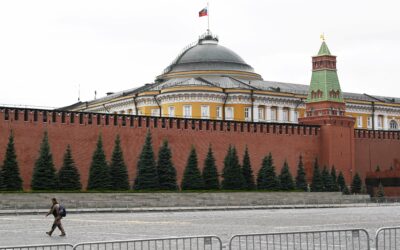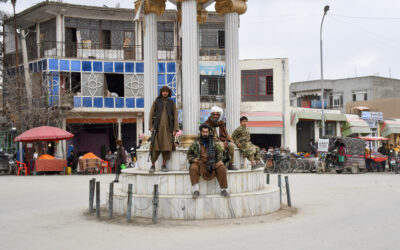
Russia’s Response to U.S. Aid: Shrugs, Disinformation and Warnings of Nuclear War
SUBSCRIBER+ EXCLUSIVE REPORTING — Russia’s reaction to the new infusion of U.S. aid for Ukraine has ranged from shrugs to fury, from warnings of nuclear […] More
OPINION — As President Joe Biden concludes his second year in office, despite many positive foreign-policy achievements, his administration can hardly afford to rest upon its laurels, in what has increasingly come to be seen as a ‘multipolar’ world.
Challenges endure such as the Ukraine war, the COVID pandemic (especially in China), inflationary economies, continued supply-chain disruptions, and US adversaries’ ruthless approaches to both asymmetric and traditional warfare.
President Biden’s biggest challenge remains in uniting a divided America, NATO and the West – along with key nations in the ‘global south’ – in understanding that this generation’s struggle against autocracy is the signature foreign-policy challenge of our time, and one which will require an embrace of late President Ronald Reagan’s bipartisan vision. Otherwise, in spite of the West’s successes last year, we risk becoming – as the historian Christopher Clark noted – ‘sleepwalkers’ in an awful history which continues to repeat itself.
Our key adversaries, such as Russia’s Vladimir Putin, North Korea’s Kim Jong-un, and China’s Xi Jinping, remain no less formidable than they were a year ago. They can best be understood by applying a moniker of the ‘Three R’s:’ ruthless, rational, and resilient. Some observers might add a fourth ‘R’ as well – revanchist. Our adversaries continue to believe that time and history – and their very legitimacy and governance outcomes – are on their side.
Subscriber+Members have a higher level of access to Cipher Brief Expert Perspectives and get exclusive access to The Dead Drop, the best national security gossip publication, if we do say so ourselves. Find out what you’re missing. Upgrade your access to Subscriber+ now.
Putin began last year by invading Ukraine, in a genocidal war of epic proportions, where Russia has suffered more than 100,000 deaths, and which has also destroyed much of Ukraine’s infrastructure and has led to the largest refugee flows in Europe since World War II.
Putin’s attempt to redraw the map of post-1991 and post-World War II Europe, has been labeled a colossal, strategic intelligence failure and his decision has led to dramatic Russian military defeats by a courageous Ukrainian military, as Putin himself has become a virtual pariah, increasingly criticized even by his allies such as China and India, whose leaders have pressed for an end to the war, and emphasized the necessity of a diplomatic solution.
Pope Francis, in his Christmas message (‘Urbi et Orbi’) to the faithful, asked the world “to see the faces of our Ukrainian brothers and sisters who are experiencing this Christmas in the dark and cold, far from their homes due to the devastation caused by ten months of war.” Such sentiments beg the question of whether Putin can be negotiated with for he continues to hold the Ukraine and the West hostage, with his brutal military tactics (supported by an ‘Axis of Evil’ with the equally ruthless Iranian regime) and unwillingness to come to the negotiating table — except on his terms. It is my belief that Putin can be negotiated with, but he will only negotiate from a position of strength, or perceived strength. And therefore, Putin must be met with resolve, determination, and steadfastness.
Nothing revealed this better than the recent hostage trade involving a swap of Britney Griner, an Olympic and WNBA athlete convicted on drug possession charges, for Viktor Bout, a former GRU officer, notorious arms dealer, and now-aspiring Russian politician. This asymmetric trade demonstrated Putin’s patience and willingness to wait over a dozen years to achieve a meaningful objective.
Xi is frequently seen as one the most formidable leaders in the world today. While he has begun to achieve his vaunted goals of the China Dream and the Great Rejuvenation of the Chinese People, domestic challenges – emergence from extreme COVID lockdowns and ongoing COVID cases, a sluggish economy with lower than projected growth rates, and China’s looming middle-income trap – as well as overseas challenges such as managing China’s strategic competition with America, await him. Xi’s recent decisions with respect to COVID controls, as well as his post-twentieth Party Congress diplomatic ‘charm offensive,’ showcase a prudent leader willing to take calculated (but not impulsive) risks. Many tend to see Xi as solely ideological, and not at all flexible. But it would be a mistake not to see in Xi’s resilience, (dating from his traumatic childhood experiences as a ‘sent down youth’) a degree of flexibility, and even ability to become, in the words of Robert Zoellick, “a responsible stakeholder.” Xi is full of dreams and aspirations, as his ‘Great Dream of Rejuvenation of the Chinese People’ demonstrates. But he would be well advised to heed the words of the novelist Delmore Schwartz, who long ago, wrote “In dreams begin responsibilities.”
North Korea’s Chairman Kim Jong-un is celebrating his eleventh year in power, serving as an ongoing reminder of a huge intelligence failure, as both American and allied predictions did not foresee him surviving in power. But the other failure is the inability of ‘strategic patience,’ or its diplomatic progeny (such as ‘complete and verifiable denuclearization’), to bear any fruit. Kim has continued to develop and expand his nuclear program with a barrage of continued missile tests, and a likely upcoming seventh nuclear test. His goals are clear: to have North Korea, a nuclear state since 2006, accepted into the ranks of nuclear powers. While diplomacy remains the only answer here, the Biden administration has struggled to achieve much headway with Kim, and bold approaches such as President Trump’s 2018 and 2019 diplomatic forays, have not resumed. And there are no more ‘love letters’ – which now seem naïve – between Chairman Kim and any U.S. President.
President Biden and other world leaders can learn much from a truly courageous, heroic leader, Ukraine’s President Volodymyr Zelensky — a Churchill-like figure, aptly named Time Magazine’s 2022 ‘Man of the Year.’ His February 2022 message from the streets of a bombed-out Kyiv is simple and profound: “We are here.” Presence matters. Leadership, values, and powerful actions – not mere words – matter. This is the lesson, a hopeful one in these dark times, that President Biden and America’s allies should heed as they begin 2023. Failure to do so carries greater risks, of becoming mere ‘sleepwalkers,’ as in 1914, in a crueler, less-forgiving, and less tolerant world. President Biden and his fellow leaders are watching. But alas, so are President Putin, President Xi, Chairman Kim, and Iran’s ailing Supreme Leader.
Read more expert-driven national security insights, perspective and analysis in The Cipher Brief
Related Articles

SUBSCRIBER+ EXCLUSIVE REPORTING — Russia’s reaction to the new infusion of U.S. aid for Ukraine has ranged from shrugs to fury, from warnings of nuclear […] More

SUBSCRIBER+ EXCLUSIVE REPORTING — When Chinese President Xi Jinping came to San Francisco last November to meet with President Joe Biden, Chinese pro-democracy activists in […] More

SUBSCRIBER+EXCLUSIVE EXPERT PERSPECTIVE — More than two years after its withdrawal from Afghanistan, the U.S. still does not have a clear way forward in the […] More

SUBSCRIBER+ EXCLUSIVE REPORTING — Ukrainians greeted Saturday’s long-awaited House passage of $60.8 billion in aid with justifiable jubilation. For months, their soldiers, civilians, and political […] More

SUBSCRIBER+ EXCLUSIVE REPORTING — A race for control of space is underway, and just as on earth, the U.S. and China are the top competitors. […] More

SUBSCRIBER+ EXCLUSIVE REPORTING — For nearly a week, the Middle East and much of the world were on a knife’s edge, waiting for a promised […] More
Search